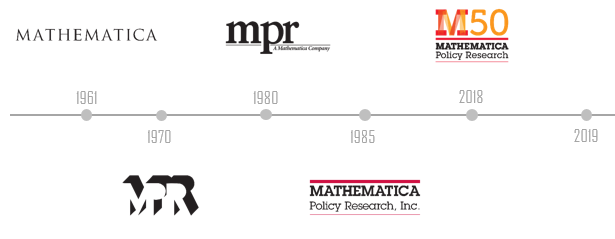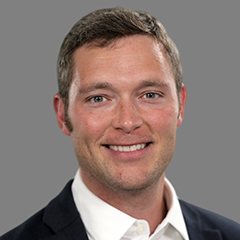
As Mathematica’s 50th anniversary draws to a close, we asked a few people who were part of the company’s beginnings to reflect on the organization’s full arc: how it began, how it has evolved, what effect it has had on public policy, and what pieces have remained core parts of the organization’s DNA. This Q&A is an edited transcript from interviews with Rob Hollister, Judith Wooldridge, and Walter Nicholson.
Hollister was the director of research for Mathematica in the early 1970s.
Wooldridge was the company’s first health area leader, the first managing director of health research, a senior vice president, a board member for nine years, and the author of “A History of Mathematica,” which she wrote after retiring in 2011.
Nicholson served as the company’s first in-house economist, a senior fellow, and a board member.
How did you first get involved with Mathematica?
Rob Hollister (RH): I was the head of the research division at the Office of Economic Opportunity, which was [the agency chiefly responsible for implementing the policies of President Lyndon Johnson’s] War on Poverty. The big thing in those days was that the welfare program was a mess and everybody wanted to reform that program. We got the idea to do a random assignment experiment, which hadn’t been done before in a social policy context. The objective was to get a good estimate of the degree to which families would reduce their work efforts in light of getting these negative income tax payments.
The question was, who’s going to execute this? I had done enough contracts to know that if you give a contract to an academic institution, it’ll be of good quality when you get it, but you never know when you'll get it. And if you gave it to a private research firm, you’d get it on time, but you had no idea what the quality would be.
It turned out that William Baumol [a well-known Princeton economist] had, with a couple of other professors, created a company that mostly did contracts with the Defense Department. It was an academic-run program, but it was in the private sector, it was not part of the university, and it had [Baumol], who was also the economic advisor to the governor of New Jersey. So we gave them the contract.
Judith Wooldridge (JW): I was living in Princeton. I was looking around for a job and there was a fellow called Robert Cunningham who was running a project and needed somebody to assist, so that’s what I did. I’d already had a research job at the University of Birmingham in England. I was looking for something kind of equivalent and Mathematica was offering the sort of work I was interested in: policy work and research. I accepted the job. I was hired as a research assistant, worked part-time for several years, and then worked my way through just about all the positions in the research department.
Walter Nicholson (WN): I had finished graduate school and started teaching at Amherst College, and I wasn’t real happy with my research on my thesis. I didn’t quite know where it was going to go, so I was looking for some other area of research I might do. [The field of] microeconometrics was emerging, and the New Jersey experiment was the hottest thing going at the time. Luckily, I was very good friends with David Kershaw [who was the director of the New Jersey Negative Income Tax Experiment], and he needed a person in-house to do econometric work for what was then called Urban Opinion Surveys, which was the predecessor of Mathematica. It was a chance for me to get into a new area of research, and it’s what I did the rest of my life.
What’s your proudest accomplishment from your time at Mathematica?
WN: Early on, we submitted a proposal to do a small study of unemployment insurance, and that led to one of the biggest studies I’d done, the study of the extended benefits program in the 1970s, which we eventually got a book out of. Since that time, we’ve studied every major recession program of unemployment insurance. We continued to study the extension of unemployment insurance benefits right through the financial crisis in 2008.
JW: There is the incredible comfort I get from knowing that I worked with so many people and that I was able to teach a lot of them things about how to do work. So there was just the sheer pleasure of knowing that I was contributing to the future of the organization. Somebody once asked me, “So what am I going to do when you’re not here?” And then she told me later, “You know what, I started asking myself, ‘Now what would Judith say?’” I thought, that’s good, because even if it’s personalized as me, what she’s doing is applying the standards that I’ve been trying to hold up for them.
I’m also proud of what I think that the company stands for. The company stands for integrity, innovation, incredibly high standards. And we expect those of each other, and we help each other, too— that was the teamwork of it all. We would help each other to get new work that was really important to our own individual careers but also for the company. It all tied together so well that it wasn’t a them‑and-us thing—we were the company. And I hope that people still feel that their personal contributions matter to the company and that they’re shaping the company. I would hate to think that in any way Mathematica became so corporate that it wasn’t all about the research. To me, that’s the heart and soul of the company.
If you had to name a contribution Mathematica has made to our understanding of how public policy works and how to make it better, what stands out?
WN: I think the major impact has been the idea that one can do nonpartisan, careful analysis of public programs. Mathematica was at the forefront of that all along. I know our work on unemployment insurance had all sorts of effects on how the programs were structured and how other various administrative actions were accomplished during the extended benefit portions of the programs. So we had a big effect on unemployment insurance regulations. I don’t want to exaggerate it because Congress kept making the same mistakes over and over again, but that’s not our fault.
RH: You had a long period of trying to find an answer to welfare reform. There were lots of experiments funded by the Office of Economic Opportunity that got done right after we started the New Jersey [Negative Income Tax Experiment]. Then the Department of Housing and Urban Development got jealous, so it created a program called Model Cities. It sent out a request for proposals, and it let the cities nominate projects of a particular subject where they wanted to run experiments to test them. Eventually all of the different agencies picked up on this idea that they should test their policies using this much better method [of random assignment experiments with econometric analysis] and other private research organizations were created to do similar things.
How has Mathematica changed since you first became involved in the company?
WN: There’s two things. One is the extension into other areas. We were primarily doing what you would call labor research when I started. That was the negative income tax experiments, unemployment insurance, and supported work. Those were the big projects. We did not have health or education as an area. So there was this expansion in areas of expertise, which of course has grown dramatically. We also never had any international work, which we have now. The second was, obviously, as computer technology and data sources became available, the techniques that were used became more and more elaborate. That all has evolved over time, just like the field of economics has in general.
What has remained constant?
WN: The spirit that [the company’s founder and first president] David Kershaw brought to the company. I remember David, almost every day at the end of the work, would go around to see how everybody was doing and crack some jokes. He used to sit up on top of a big filing cabinet and call out people’s names and see what’s going on with you today. I think that spirit of being a close-knit group of people still exists. It’s very hard with a 1,200-employee company now, but the spirit of trying to get something accomplished and doing it with good nature—I think made [Mathematica] a very exciting place to work.
JW: At Mathematica, it was our work, our reputation, and our people that mattered. You had to have really sound people who knew what they were doing and who the clients trusted. So, that’s what you have to keep your focus on. Nothing else has any importance compared with that.


